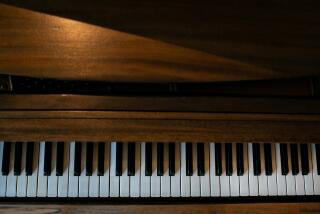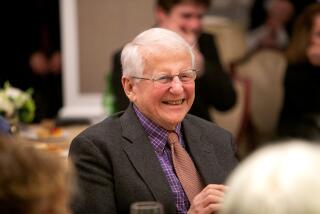Review: REDCAT’s Christian Wolff programs a lesson in virtuosity
An authority on Euripides, Christian Wolff is a retired professor of Greek and Latin classics (along with Marxist literature), having taught at Harvard and Dartmouth for many years.
He is also one of America’s most unpredictable, most venturesome, most radical (politically and compositionally), most inventive, most satisfying (intellectually, aesthetically and musically) and, at 79, least recognized (at least by America’s musical establishment) living composers.
In addition to all that, he happens to be the last living musical link to the New York School of composers and artists who gathered around John Cage in the 1950s.
PHOTOS: Arts and culture in pictures by The Times
Now maybe at long, long last, Wolff’s time may have begun to come. Last year, the University of Illinois Press added an excellent small monograph on Wolff to its invaluable American Composers series. A wave of Wolff recordings has been providing regular new releases of his music. And Monday and Tuesday night, CalArts played catch-up by devoting two compelling programs to Wolff at REDCAT.
I love Wolff’s music and his ideas. But he is no friend to a reviewer. On Monday night, in a program of music for strings featuring the Formalist Quartet, there were four pieces by Wolff. The program the next evening contained six of the composer’s scores, this time for larger mixed ensembles, including one for the audience.
Ten works by Wolff call for 10 reviews. Each composition is a unique artistic construct. One piece does not sound like another piece. One minute may not even sound like the next in the same piece.
Stuck, I call up a comment the composer and pianist Michael Pisaro made to the audience Tuesday before asking our help in performing “You Blew It.” Pisaro described Wolff’s music as being about activity. We were then invited to recite, chant, sing, shout, whisper, or coo the three-word title for three minutes. We were given instructions on how to exercise freedom. The performance began tentatively and ended exultantly. A subtle sense of responsibility entered the room. That’s how Wolff works, but of course, all the other pieces also work very differently.
The programs skipped over Wolff’s music from the 1950s, but it is important to mention where his style and thinking came from. He was a teenager when he began studying with Cage in 1950 and when he was quickly absorbed into Cage’s circle. That obviously influenced his capacity to conceive of music as actions.
Wolff just as obviously went his own way academically and musically. He never broke away from Cage. He was asked to write pieces for the Merce Cunningham Dance Company, and after retiring from Dartmouth, Wolff even joined the company as a pianist.
STORY: Christian Wolf at REDCAT and other classical music in spring
And yet the essence of Wolff is how he doesn’t connect to any school. The range of interests revealed in the 10 works at REDCAT was staggering. Some pieces were abstract, notated specifically and required a high degree of virtuosity. Others were more graphic and asked for creativity from the performers. Yet there is a kind of intellectual and artistic integrity that somehow makes a Wolff work a Wolff work.
A critic of the Vietnam War, Wolff began writing politically motivated music in the late ‘60s. “Changing the System,” which concluded Tuesday concert, used a 1972 text by Tom Hayden found in Rolling Stone magazine.”For E.C.” is a 2003 string quartet that was written in tribute to Elliott Carter on his 95th birthday in a quirkily formal style that Carter might have recognized. The exceptionally beautiful and fluid “Trio V for James Tenney” for piano four hands and percussion, memorialized that experimental American composer three years later in a completely different way.
Melody, rhythm and timbre are all areas in which Wolff has made individual studies. “For 2 Violinists, Violist and Cellist,” from 2008, is a gripping half-hour journey into the texture of strings. The earlier (1972) “Lines,” which adds a second cello (Erika Duke-Kirkpatrick) to the string quartet, investigates spatial string sounds.
A ruminative piece for a dozen percussions, “Fall III,” lets the players choose their instruments but not their rhythms. “For 1, 2 or 3 People,” which got an alluring performance from electric guitarist Michael Jon Fink, clarinetist Brian Walsh and vocalist Andrea Young, is a 1964 study in human interaction. Excerpts from the heartfelt large ensemble piece “John Heartfield (Peace March 10)” uses as text a chronology of the Dada artist’s life.
Wolff did not attend the REDCAT concerts, apparently unable to be released from duties at UC San Diego, where he is currently in a short residence. But his spirit was felt in committed performances, and ferociously so by the fabulous Formalists, who are about to record Wolff’s quartet music.
The spirit was also transmitted in “Lullaby 3” by Nicholas Deyoe for string quintet (the Formalists and Duke-Kirkpatrick). The young Los Angeles composer’s intriguingly complex and excitably lush lullaby, sure to toughen up the ears of any baby, was added to demonstrate the value of Wolff’s influence on a new generation.
MORE
INTERACTIVE: Christopher Hawthorne’s On the Boulevards
CHEAT SHEET: Spring Arts Preview
PHOTOS: Arts and culture in pictures
More to Read
The biggest entertainment stories
Get our big stories about Hollywood, film, television, music, arts, culture and more right in your inbox as soon as they publish.
You may occasionally receive promotional content from the Los Angeles Times.











